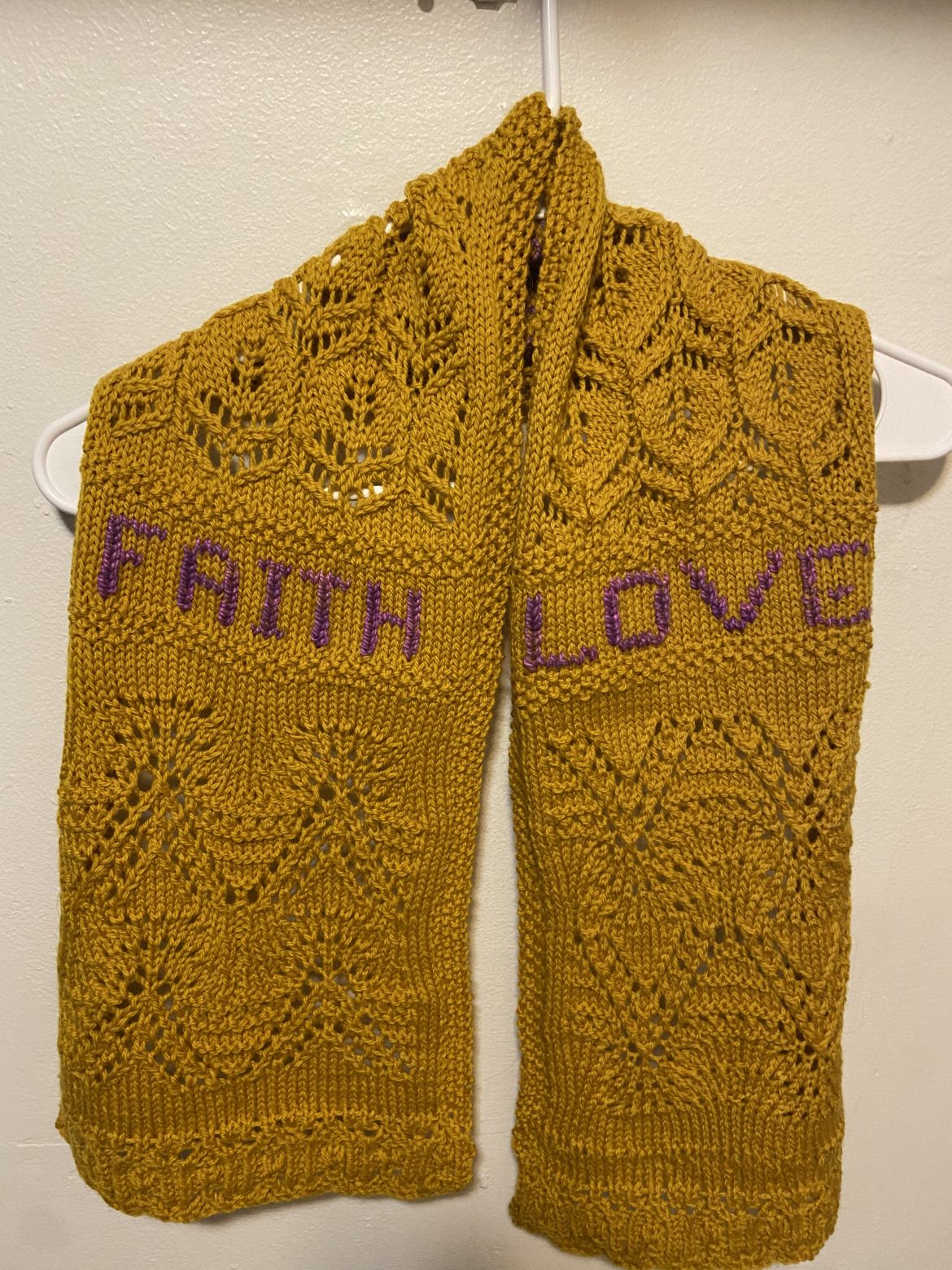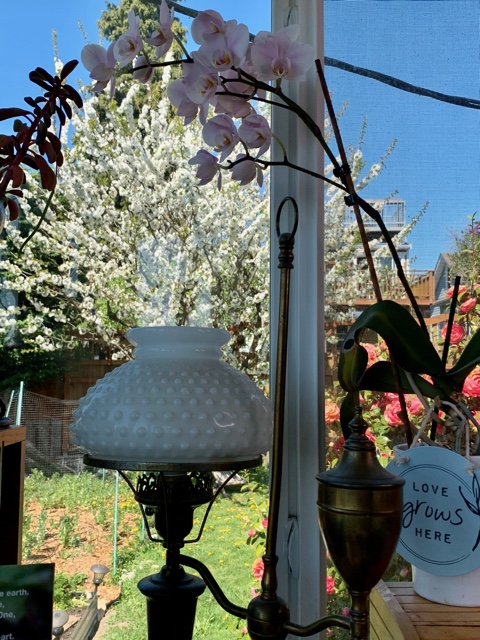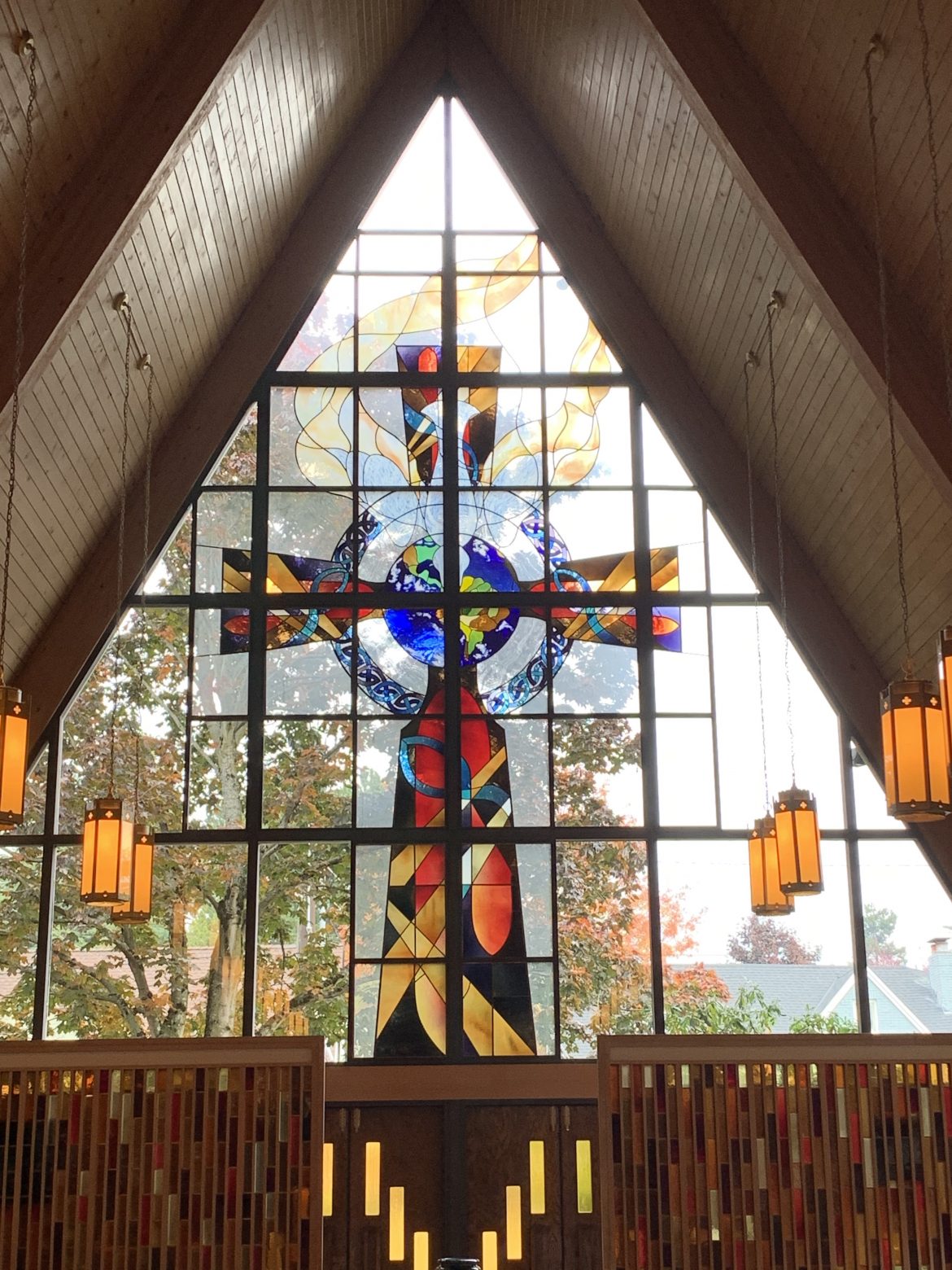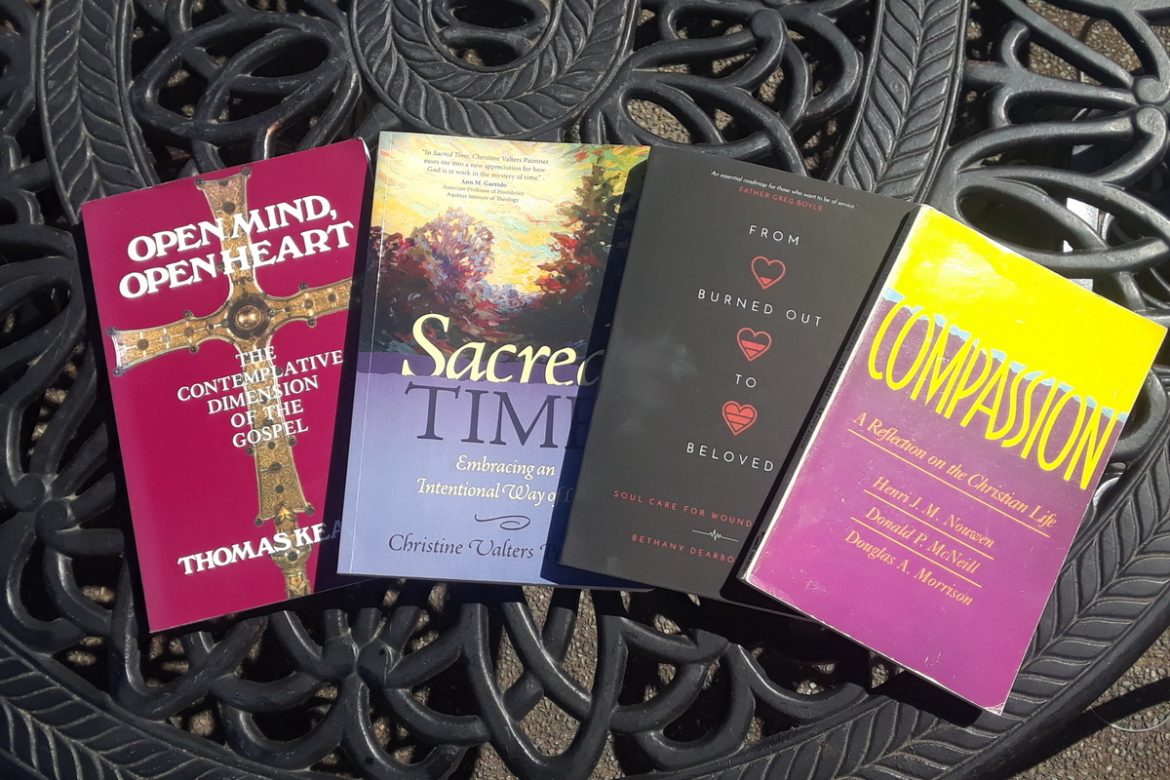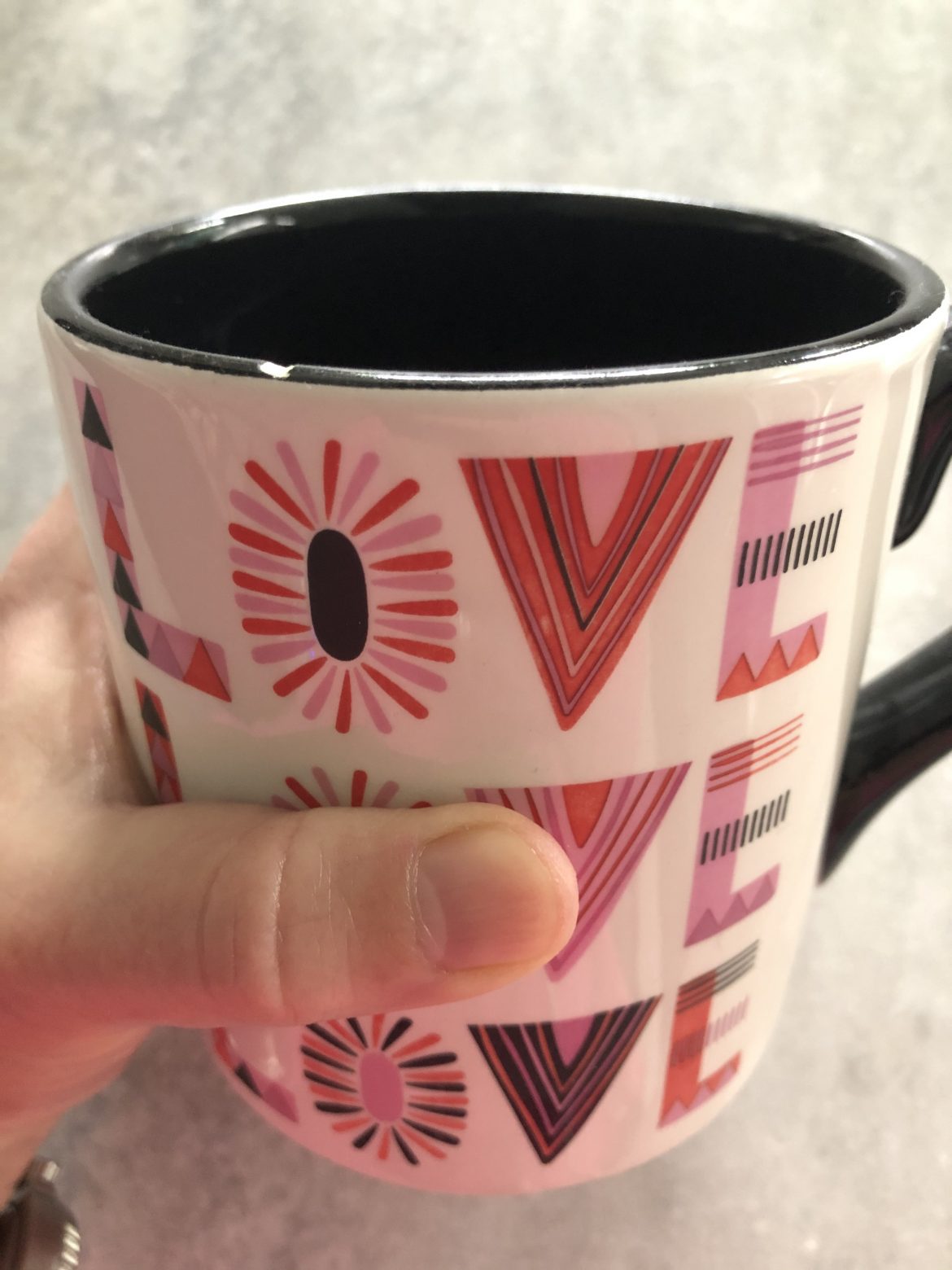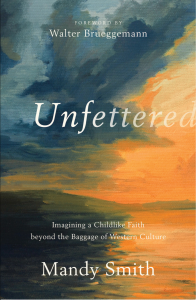photo and post by guest writer, Julie Cicora,
You can’t say “just a minute” to screaming infants. Their cries just intensify. An infant doesn’t care that you need to plunge the boiling eggs into cold water at a specific moment so you can be sure the shells will come off easily. The infant doesn’t care that you have finally been taken off of hold after waiting for what seems hours in order to get the duplicate restaurant charge off your credit card bill. The baby is hungry and just wants to eat. This is called “feeding on demand.” Imagine stopping whatever you are doing every two to three hours to sit and spend twenty minutes being fully present to another human being.
My experience with feeding on demand happened before the advent of cell phones and doom scrolling. I was forced to stop and essentially do nothing except hold, feed, and bond with my child. Those forced moments of rest and bonding changed my perception of time. The demands of the frenetic activities that had ruled my life faded into the background and time seemed to slow down. There was time to be present to my child. There were moments when I would stare in awe at the baby I was cradling and feel the love wash over me. However, as my child grew, outside demands crept back into my life, the space the child created disappeared, and I was left wondering how to get that time back.
No one could give it back to me. I had to give it back to myself.
For years, I struggled. I trained my young children to be quiet and wait when I told them “just a minute.” I was distracted by work and the chores of everyday life. It felt like there was barely enough time in the day to do the essentials.
There were moments when I rediscovered how to be fully present to my loved ones. Something would happen like a child climbing onto my lap with a scraped knee or my husband coming home after a long business trip that would pull me back to that sacred bonding time. But the moments were rare.
And then I discovered prayer. It changed everything in my life.
I didn’t believe in prayer at first. I needed to pray because I felt called to the ordained ministry and ministers prayed. I wasn’t sure how to pray other than to utter the prayers I learned as a child. Fortunately, a friend gave me the book Beginning to Pray by Anthony Bloom. I made a surprising discovery. In the book, the author advises a woman who is having trouble feeling the presence of God to sit and knit. The woman spends some time knitting in silence and she becomes aware of a loving presence. Could knitting help me regain that time of rest and bonding?
I had been unable to force myself to stop what I was doing to sit and pray until I tried knitting. Every time I tried to pray; the distractions would be too overwhelming. Knitting calmed me down and allowed me to let go of myriad of thoughts that plagued me. Soon I was sitting down three times a day to knit and pray. This new rhythm recreated the time and space I needed. It gave me the ability to become fully present to others in my life. It gave me time to love.
For years I have sat down to pray each day. My needles click rhythmically, and I am aware of the yarn forming stitch after stitch. I am intentional about sitting in the presence of God even when I feel nothing. It is enough to know the love of God surrounds me. Although, it may seem as if nothing is happening during this time of prayer, the rest of my life is transformed by the practice. I am able to prioritize my time for love. I am able to present in the moment. I can listen and be accessible.
Prayer has enabled me to find that sacred time of restoration and bonding that I discovered when I first heard the hungry cries of my infant son. Prayer is what feeds our hungry cries. It provides the time to immerse ourselves in the presence of love. And that love is what changes everything.
Bio for Julie

Julie Cicora
Julie Cicora is an avid knitter who believes in the power of prayer. After being ordained as an Episcopal Priest, Julie began studying prayer which led to her first book All I Can Do Is Pray about her experience as a hospital chaplain. She started a contemplative prayer practice which she found very hard to sustain until she combined it with knitting. Knitting opened the door to a daily prayer practice for Julie and other knitters who have participated in Julie’s Lenten Knit alongs. Julie’s second book Contemplative Knitting, full of stories and suggestions for how to sustain a daily prayer practice was just released in March.
Julie is available to speak to knitting groups, conduct knitting retreats either virtually or in-person (post-Covid).
Julie received her Masters of Divinity at Colgate Rochester Divinity School and was ordained in 2000 after a twenty-two-year career at Hewlett-Packard in sales. She lives in upstate New York with her husband. Outside of work, she likes to ride her motorcycle, windsurf, knit, write, and visit her five sons and twelve grandchildren.
For another great post regarding knitting, check out Knitting as A Spiritual Practice by Lisa Scandrette.
Spirituality of Gardening Online Course is on sale now for only $29.99! Makes a wonderful gift for this Spring season (or for a pick-me-up in Autumn)!
post and photos by Sue Duby,
Chuck dreamed of a serious “downsize” for a long while. After one too many years of mowing lawns (since he was a little guy so the story goes!), trimming trees and repairing leaks, he hoped for the moment to unfold in our move to Northwest Arkansas. I wrestled to join his dream and added a few “ok … if …” thoughts to his. A yard for my flowers. Big windows and happy light. Décor that whispered, “Gather here for rest, safety and warmth”.
A few weeks of hunting left us discouraged, frustrated and tense (call it one of those record times in our marriage). With no clue how to move forward, we suddenly stumbled on it. A new listing. A townhouse. When the front door swung open, I knew I was home. Depending on the day, we now call it our English cottage (great gardens!) or our Beach Cabin (though the nearest beach is over 700 miles away).
In the excitement, I never really noticed a lot of details… many only realized a few months after moving in. Our driveway sat back on a small cul-de-sac (fewer cars). Our back fence bordered two beautiful homes (with treed landscapes for us to enjoy). Two small turns led to the exiting gate (quick access). Three minutes on the gas pedal dropped me in front of the grocery store. And more… including a shared wall with our neighbor’s unit.
Elderly Joe spent his hours inside, with never a sound floating through the walls to our home. Every few days, we’d catch him on the driveway grabbing the newspaper. With only quiet nods from him, we set a goal to continue our greetings and one day earn a smile. The smile finally came. After a few years, Joe passed away, the unit sold and became a rental.
Dave moved in and we began the dance again. Shared a meal in our home. Befriended his vicious looking Doberman, discovering a big baby under all those muscles. Rescued Dave from a flood during the big freeze, when we discovered water gushing from his garage. And this week, Dave moved. Rumor said the unit will soon be sold again.
One night as Chuck and I sat under the stars in the backyard, we discovered thoughts bubbling up in each of us and we dared to share them (true confession time). I frowned. “What if they decide to plant trees next to the fence and ruin my perennial garden?”. “What if they are noisy and strange?” “What if they don’t want me taking charge of the median between our driveways where I ALWAYS plant MY flowers?” Chuck: “What if they have an unruly dog… or worse two dogs?” “What if they build a patio and we lose our privacy?” “What if we can’t be friends?”. The questions continued to spill forth.
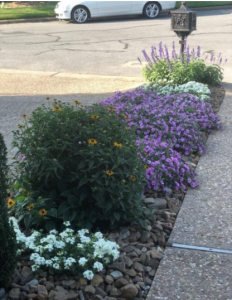
“MY” median
Along the way, that familiar unsettling stomach churning began. And then a whisper… ”What about what I want?”… and I knew it was time to pause. “What You want Lord? WHO you want Lord?”. Those questions had not entered my mind.
Suddenly it hit. We’d made a long list in our pondering together. A lengthy stream of “I want _______, I want ________, I want _______”. All about us. All to do with what would seem to keep us happy, content and loving our space (as if we even know what that would truly be!). How can it be after all these years… still discovering how very human we are… how easily we fall back into self-focus… and forgetting how we really want to live.
I sheepishly turned to Chuck. “I think we’ve been so selfish. Only thinking about us.” He nodded and sighed… and we began our reframing. Taking a step back and working to get His view. Within a few minutes, the load felt lighter. Our smiles returned. We traded new ideas. “Lord, bring who you want to the unit”. “Show us how we can be the neighbor they need.” “Have your way.” “Let us be part of Your plan, instead of forcing our own” (as if we could even do that!).
The story is yet to be written, but we’re excited for this next adventure. The “For Sale” sign appeared today. We wait with the empty townhouse beyond our wall … yet a bit anxious, but settled. May He continue to keep our hearts open to receive (and welcome) all who come our way.
And you shall love the Lord your God with all your heart, and with all your soul (life), and with all your mind (thought, understanding), and with all your strength.’ 31 This is the second: ‘You shall [unselfishly] love your neighbor as yourself.’ There is no other commandment greater than these.” Mark 12:30-31 Amplified
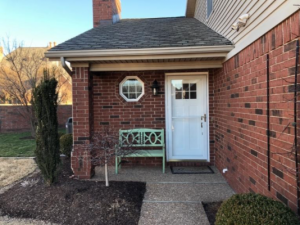
Welcome all…
New Bundle on sale includes best selling book, To Garden with God and The Gift of Wonder Prayer Cards.
This sale ends on May 11th!
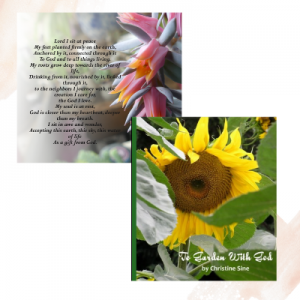
by Christine Sine
For the last few days, my usual contemplative practice has been derailed by the cherry tree blooming gloriously outside my office/sacred space window. It is absolutely breathtaking, even more so because of the way it is framed by my indoor orchid. I make no excuses for this derailment, as there is nothing more refreshing to my spirit than nature and as we celebrate Earth Week this week, culminating in Earth Day on Thursday, I am making every excuse that I can to enjoy the beauty of God’s creation, but the cherry tree definitely wins the prize. Now we wait in hopeful anticipation for the harvest.

cherry tree in bloom
I say hopeful because there is no guarantee. A good harvest does not just depend on lots of blooms. It depends on good soil, the right climate, plenty of blossoms and pollinators… and, it seems, good neighbours. Cherry trees cross pollinate with other varieties and we thought we had that covered as our tree has three varieties grafted onto it. What we did not realize is that our next door neighbour’s ornamental cherry was interfering with our harvest. It had been especially bred to create spectacular blooms but no fruit, and it convinced the cherry tree to do the same. When the tree was cut down, suddenly our tree produced cherries in abundance.
Other fruit is influenced by pollinators in different ways. Sweet peppers, for example, can be unexpectedly hot if we have planted them too close to hot peppers. And don’t try keeping squash seed for next year’s planting unless you have been able to keep different varieties well separated. You have no idea what you will produce.
So many faith lessons to absorb here, too. How many Christians have you known that have bloomed beautifully but never produced fruit? The soil around them seems to be good, and they have been well watered and fertilzed but nothing happens beyond the spectacular blooms. My cherry tree makes me wonder, How much notice do we pay the neighbours around us? In what ways do they influence our harvest?

Cherry blossom in bloom – close up
First, do we have good pollinators around us? Diversity is the name of the game. The fruit we are meant to produce will not come to maturity unless it is pollinated by others. Sit snd think about that for a while. None of us produce fruit without the input of friends and leaders. And it is much more likely that we will produce good fruit if our “pollinators” are not like us, but are from another fertile and productive tree. God’s people thrive when they live in the midst of a diverse and productive community.
Second, is there someone else nearby who is a bad influence and needs to be “cut out”? On the surface, they may look like a productive plant. They produce lots of blooms but the fruit never matures and they have the same effect on us. “Cutting them out” and not allowing them to pollinate us with their ideas can be hard, because they really do look beautiful and we are dazzled by the display. Probably one of the hardest questions we ever need to ask ourselves is: “what kind of fruit do my leaders and those who influence me produce?”. We live in a time where it seems that many are pollinating with hate rather than with love and we need to assess the influences that shape the fruit we produce.
Third, what does our fruit look like? As I thought about this today, I was reminded of Galatians 5:22-23 and I recommend you spend time meditating on it this week:
But the fruit produced by the Holy Spirit within you is divine love in all its varied expressions: joy that overflows, peace that subdues, patience that endures, kindness in action, a life full of virtue, faith that prevails, gentleness of heart, and strength of spirit. Never set the law above these qualities, for they are meant to be limitless. (TPT)
I love how The Passion Translation expresses this: “the fruit produced by the Holy Spirit within you is divine love in all its varied expressions”. When we have been well pollinated by others, when we dwell in the midst of enriching diverse communities, we are much more likely to produce a rich and tasty harvest, a harvest of divine love that looks like overflowing joy, peace that subdues violence, patience that endures, kindness in all our actions, a strong spirit and much more.
So, if spring is bursting out around you, and there are cherry trees in full bloom, go out and enjoy them, but spend time thinking about the fruit they will produce too.
One perfect way to celebrate Earth Day is by signing up for the Spirituality of Gardening Online Course!
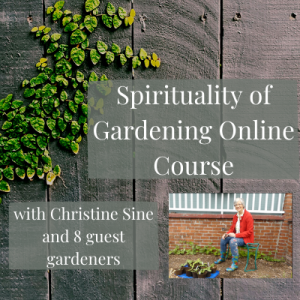
Another beautiful Taize Style service from St Andrews Episcopal church in Seattle
A contemplative service with music in the style-of-Taize for the Second Sunday of Easter. Carrie Grace Littauer, prayer leader, with music by Kester Limner and Andy Myers.
Permission to podcast/stream the music in this service obtained from One License with license #A-710-756 with additional notes below:
“Surrexit Christus,” “The Lord is my Song (O Lord Hear my Prayer),” and “Da Pacem Cordium” are songs from the ecumenical Taize community in France. Copyright and all rights reserved by GIA/Les Presses de Taizé.
“Kyrie for April 18th” – text and music by Kester Limner, shared under the Creative Commons License, Attribution (CC-BY).
I often describe myself as a contemplative activist, a term I used before it became fashionable. It grew out of my frustration that many contemplatives never seemed to get involved in the needs of the world around them. In our season of Time for Love, we want to be sensitive and respond to the needs of others in our hurting world. According to some articles, mindfulness and contemplative practices can make us more narcissistic and self-centred. So how do we avoid that? Here are some books that I think might help:
- Centering Prayer and Inner Awakening by Cynthia Bourgeault
- Dancing Standing Still: Healing the World from a Place of Prayer by Richard Rohr
- Everything Belongs: The Gift of Contemplative Prayer by Richard Rohr
- Open Mind, Open Heart: 20th Anniversary Edition by Thomas Keating
- Moving in the Spirit: Becoming a Contemplative in Action by Richard J. Hauser
- The Active Life: A Spirituality of Work, Creativity and Caring by Parker J. Palmer
- Barking to the Choir: The Power of Radical Kinship by Greg Boyle
- Compassion: A Reflection on the Christian Life by Henri J.M. Nouwen, Donald P McNeill, and Douglas A. Morrison
- From Burned Out to Beloved: Soul Care for Wounded Healers by Bethany Dearborn Hiser
- Sacred Time: Embracing an Intentional Way of Life by Christine Valters Paintner
By Lilly Lewin,
The story of Easter Sunday, the story of Resurrection comes with many emotions. The women at the tomb were frightened and astonished by the angels who told them that Jesus wasn’t there, HE IS RISEN. Peter and the other disciples were so afraid of getting arrested that they hid themselves away. Peter and John ran to the tomb in expectation not sure what they would really find. There were inklings of faith, yet there was still a lot of doubt. In fact Thomas gets the nickname “doubting Thomas” because he wanted physical proof that Jesus was really alive. He didn’t want to take the word of the women or even his good friends. He wanted to see and touch Jesus himself.
Last Friday, we started considering the Easter Cups we can use to pray with between now and Pentecost. Like the early followers of Jesus, we need time to process the many emotions that we have in this season of Resurrection.
Today, we are praying with the Easter Cup of Doubt and Fear.

The Cup of Doubt and Fear
The Cup of Doubt
This week, I’ve felt a lot like Thomas.
Carrying a cup of doubt around.
A cup empty of belief.
There is so much brokenness.
So much pain.
Another young black man killed by police.
Like Thomas, I am doubtful…
I doubt that white people can
understand the fear and pain of our black and brown friends.
I doubt the will of the people to actually make changes to ALL THE BROKEN SYSTEMS that keep people of color enslaved.
I doubt the ability of our selfish culture to see all the broken systems that keep people of all colors in poverty!
I doubt myself and my ability to make a difference!
Like Thomas, I need help to believe again.
I need to see for myself!
I need to touch Jesus!
I need to touch his wounds and remember.
To see Love & Forgiveness in his eyes!
I want to drink in Love, not hate & bitterness.
I need to hand over the cup of doubt and let Jesus hold it for me
Let Jesus pour it out for me!
Let Jesus refill that cup with Hope
So I can drink the Easter Cup even in the middle of a dark week.

What is in Your Cup?
HOLD YOUR CUP.
How about you? What is in your cup this week?
Have you been drinking in New Life or feeling more like Thomas and Peter?
What are the doubts in your cup?
What are the doubts and fears that you’ve been drinking?
Talk to Jesus about this.
HOLD YOUR CUP. Imagine all the doubts and all the fears you’re carrying around and drinking in this week. Are you willing to let Jesus have your cup of doubt, your cup of fear today?
I am very grateful that Jesus isn’t afraid of our doubts and He understands our fears and our need to see for ourselves. Be honest. Talk to Jesus about where you really are. Allow Jesus to hold this cup for you today.
Let Jesus fill your cup with just what you need today, especially His abundant grace and love!
©lillylewin and freerangeworship.com
New Bundle on sale includes best selling book, To Garden with God and The Gift of Wonder Prayer Cards.
This sale ends on May 11th!

guest post by Mandy Smith,
It’s a common question and one I’ve asked many times in many ways. It paints God as oblivious, distant, uncaring. As many times as I’ve asked it, I’ve never found a satisfying answer. But the way Mark’s Gospel tells the story makes me think again.
“First Mark invites us to a meal where a woman upsets the proceedings by pouring a jar of perfume worth a year’s salary on Jesus’s head. She goes against all sense of decorum and common sense. What a scene! What a waste! Her behavior flies in the face of all that empire values. But she is anointing a different kind of king. And unlike the others in the room, Jesus welcomes her actions. He embraces this outcast who knows the abandon and the abundance of kingdom. The others misunderstand, they shame, they disregard. He could choose to acquiesce to their expectations of him. But Jesus is driven by something better than their approval. In pressing toward it, he dies this social death.
Next, we’re welcomed into another room and another meal. This time Jesus celebrates Passover with his disciples and, even as they eat, Jesus predicts that one of them will betray him and that the rest will desert and deny him. At the moment when their friend needs them the most, when he is most clear about who he is and what the kingdom requires of him, they will flee. Knowing this will happen, Jesus could just drop the plan, go back to a normal life, set aside the conflict that his choices are bringing. But he presses on toward kingdom, even when he knows his own friends will choose comfort and safety (and, in some cases, empire). In pressing toward kingdom, Jesus dies this relational death.
Then Mark takes us to the scene in the garden of Gethsemane and lets us see just how much Jesus is breaking under the weight of this kingdom vision. The waves threaten to smash this clay vessel to pieces. He throws himself to the ground in distress, agitated beyond description. He cries out to the Father as a child cries, torn between a desire to be obedient and a deep, bodily sense of what it will cost. Will this emptying of his will leave him with no self left? And even in the face of his friends’ rejection, even in the midst of this angst, Jesus again chooses kingdom. In so doing, Jesus dies an emotional and existential death.
The day should be dawning after this excruciating night, but Mark’s telling only gets darker as we find Jesus facing a trial before the religious leaders. Empire is looking for a reason to put him to death. Empire asks “Are you?” and Jesus says “I am.” It’s all empire needs to hear to do away with him. He could have continued his silence. He could have questioned his own call. He could have returned to Nazareth. But once more something better than safety drew him forward. He has already died to social status, emotional security and existential equilibrium, and his own will. Now, in the face of impending physical harm, he dies to his own self-preservation instinct. He dies to any claim empire might have on him. He does so because of the claim that kingdom has on him. These deaths allow him to welcome the kingdom as a child. And then comes the final death.”
As Christians, we talk a lot about Jesus’ death but for those of us still living, it can seem rather distant, even abstract. What difference does his death really make if the world is still so broken? So it helps me to see how many deaths Jesus died, well before he hung on that cross. On a daily basis he died to his own comfort and convenience and control. In his desire to keep pressing toward the Kingdom, he lost friends, safety, stability. He was misunderstood, betrayed, forsaken, denied, accused by people he trusted—each choice a death to his relational and social and emotional well-being. He knows that to be like us is to experience all those levels of human life (and death).
Yes, it’s natural for us to ask, “How could a loving God . . . ?” And when we do, we imagine we’re the ones suffering while he’s sitting far off in a distant, cosy heaven. But Jesus has solidarity with us in our suffering, as we have solidarity with Him in His.
How could a loving God? A loving God could suffer with us to show us that suffering will ultimately not alienate or overcome us. A loving God could bear rejection just for the sake of being with those who would receive him. A loving God could enter into our experience to redeem it, in all its brokenness.
And he has.
“Christ’s sacrifice of himself for us . . . is not only his death on the cross, but the psychological, spiritual and personal alienation. . . . When our sufferings are joined to Christ’s they become redemptive for us personally.” –Thomas Keating.
“Whatever it means that God loves us, whatever it means that God takes care of us, it clearly does not mean that God stops painful things from happening to us.” –James Finley
Excerpt from Unfettered: Imagining a Childlike Faith Beyond the Baggage of Western Culture by Mandy Smith, adapted for Godspace blog.
Bio for Mandy Smith
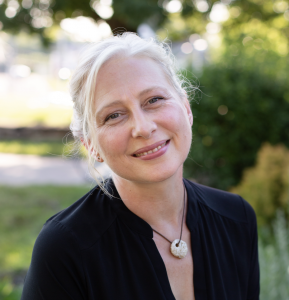
Originally from Australia, Mandy Smith is a pastor and author of The Vulnerable Pastor: How Human Limitations Empower Our Ministry (IVP). Her next book, Unfettered: Imagining a Childlike Faith Beyond the Baggage of Western Culture (Brazos), releases in May and is available for pre-order. Mandy and her husband, a New Testament professor, live with their family in a little house where the teapot is always warm.
Spirituality of Gardening Online Course makes a wonderful gift for this Spring season (or for a pick-me-up in Fall)!
As an Amazon Associate, I receive a small amount for purchases made through appropriate links.
Thank you for supporting Godspace in this way.
When referencing or quoting Godspace Light, please be sure to include the Author (Christine Sine unless otherwise noted), the Title of the article or resource, the Source link where appropriate, and ©Godspacelight.com. Thank you!

